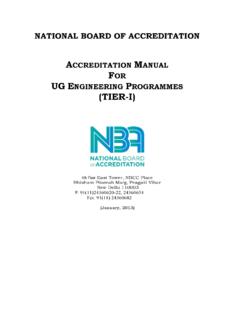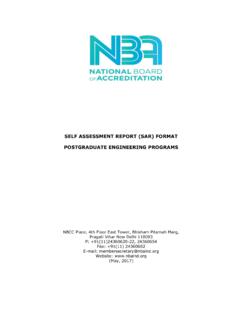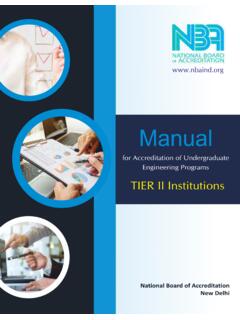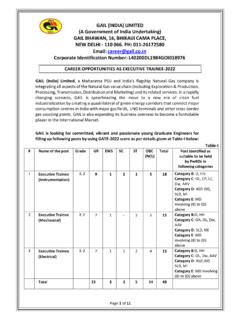Transcription of TIER 1 Full With Annexure Proof - National Board of ...
1 Manual for Accreditation of Undergraduate Engineering Programs (Tier I Institutions). National Board of Accreditation New Delhi Manual for Accreditation of Undergraduate Engineering Programs (Tier I Institutions). National Board of Accreditation New Delhi NBA, New Delhi, 2019. Address: National Board of Accreditation, NBCC Place, 4th Floor, East Tower, Bhisham Pitamah Marg, Pragati Vihar, New Delhi 110003; Ph: +91(11)24360620-22; Fax: +91(11) 43084903;. E-mail: website : Vision Mission To stimulate the quality of teaching, To be an accrediting agency of self-evaluation and accountability international standard by ensuring in the higher education system, the highest degree of credibility in which help institutions realize their assurance of quality and relevance academic objectives and adopt to professional education and come teaching practices that enable them up to the expectations of its to produce high-quality stakeholder's viz., academicians, professionals and to assess and corporates, educational institutions, accredit the programs offered by the government, industry, regulators, institutions imparting technical and students and their professional education.
2 TABLE OF CONTENTS. 1. Introduction 1-3. National Board of Accreditation 1. Objectives 1. Governance Structure 2. Tier I Institutions 2. Washington Accord 3. 2. Accreditation Policy 4-6. General Information on Accreditation 4. Outcome-based Education and Accreditation 6. 3. Accreditation Criteria 7-14. Terminology in Accreditation 7. Program Outcomes (POs) and Program-Specific 8. Outcomes (PSOs). Accreditation Criteria 10. Accreditation Criteria - Marks Distribution 14. 4. Accreditation Process 15-27. Accreditation Stages 15. Award of Accreditation 24. Appeal 26. Continuation of Accreditation 26. Accreditation Fee 26. Reconsideration of Program 27. Annexures I) Fee Structure 30. II) Pre-qualifiers 34. III) Self-Assesment Report 44. Documents regarding Visit of Experts IV) Pre-visit Preparation for the Chairman 88. V) Pre-visit Evaluation Report for Evaluator 92. VI) Visit Schedule 100. VII) List of documents to be verified during the Visit 106.
3 VIII) Evaluation Guidelines 112. IX) Chairperson's Visit Report (Part A, B and C) 138. X) Evaluator's Visit Report (Part A, B and C) 166. XI) Certificate of Participation (to be filled-in by Chairperson of the Visiting Team) 200. XII) Certificate to be filled-in by Head of the Institution 204. XIII) Feedback Form to be filled-in by Institution 208. PART - I. National Board of Accreditation 1. Introduction National Board of Accreditation The National Board of Accreditation (NBA) was set-up in September 1994 by the aicte to assess the qualitative competence of the programs offered by technical and professional educational institutions from diploma level to post-graduate level in engineering and technology, management, pharmacy, architecture and related disciplines, which are approved by appropriate statutory regulatory bodies. NBA came into existence as an independent autonomous body with effect from 7th January 2010 with the objectives of assurance of quality and relevance to technical education, especially of the programs in technical disciplines, , Engineering and Technology, Management, Architecture, Pharmacy and Hospitality, etc.
4 , through the mechanism of accreditation of programs offered by technical and professional institutions. The Memorandum of Association and Rules of NBA were amended in April 2013, to make it completely independent of aicte , administratively as well as financially. NBA conducts evaluation of programs of technical institutions based on evaluation criteria and parameters laid down by its Committees and Council. NBA works closely with all the stakeholders to ensure that the programs serve to equip graduates with sound knowledge of fundamentals of the discipline and to develop in them an acceptable level of professional competence that would meet the needs of profession and be adequate for the responsible fulfilment of professional assignments. Objectives Major objectives of the NBA for engineering education are as follows: F To assess and accredit the engineering education programs at diploma, degree and post-graduate level;. F To evolve standards and parameters for assessment and accreditation in line with the parameters laid down by the appropriate statutory regulatory authority for co-ordination, determination and regulation of standards in the concerned field of technical education.
5 F To promote excellence through a bench marking process, which is helpful in determining whether or not an institution is able to achieve its mission and broad based goals, and in interpreting the results of the outcomes assessment process;. F To promote quality conscious system of technical education where excellence, relevance to market needs and participation by all stakeholders are prime and major determinants. F To build a technical education system as facilitator of human resources, that will match the National goals of growth by competence, contribution to economy through competitiveness and compatibility with societal development;. Tier I. 01 Institutions F To set the quality benchmarks targeted at global and National stockpile of human capital in all fields of technical education;. F To conduct evaluation of self-assessment of technical institutions and/or programs offered by them on the basis of guidelines, norms and standards specified by it; and F To contribute to the domain of knowledge in quality parameters, assessment and evaluation.
6 Governance Structure The NBA is empowered by its Memorandum of Association (MoA). The governance of NBA is effected through the following three statutory committees enshrined in its MoA: i) The General Council (GC). ii) The Executive Committee (EC). iii) The Academic Advisory Committee (AAC). Details of the constitution, functions and responsibilities of the above Committees are provided in the MoA of NBA and are available at All these committees are chaired by the Chairman, NBA. Member Secretary is the Member Secretary of these committees. Member Secretary is the Executive Authority of NBA. Besides, the NBA also have the following other committees and sub-committees: F Sub-Committee of AAC of Engineering & Technology functions separately to evolve standard for assessment and accreditation, to form assessors' panels, to lay down guidelines for assessors, to evaluate and approve the recommendations of the Evaluation and Accreditation Committee (EAC).
7 F Evaluation and Accreditation Committee (EAC) of Engineering & Technology reviews the reports of the evaluation team and submits its recommendations on accreditation to the Sub Committee of AAC. F Appellate Committee considers the appeal applications made by the institutions against the decision on accreditation of a program by NBA and gives its recommendations to the Academic Advisory Committee (AAC). Tier I Institutions The categories of institutions that qualify for Tier I accreditation for undergraduate engineering/technology programs through NBA are given below: Tier I. Institutions 02. National Board of Accreditation F Institutions of National importance (Indian Institutes of Technology (IITs), Indian Institute of Science (IISc). and Indian Institutes of Information Technology (IIITs) etc. F National Institutes of Technology (NITs). F Central Universities (Universities established by or under Act enacted by Parliament of India). F State Universities (Universities established by or under legislation enacted by the legislature of the concerned States).)
8 F Private Universities (Universities established by or under legislation enacted by the State legislature but promoted by private trusts, societies, companies under Section 8 of Indian Companies Act). F Deemed-to-be-Universities (Institutions declared as Deemed-to-be-Universities by MHRD). F Institutions declared as Autonomous by a competent empowered authority. These institutions have freedom to design, develop and update curricula and also have complete academic autonomy. Washington Accord The Washington Accord is an international and multi-lateral agreement among bodies responsible for accrediting undergraduate engineering degree programs, originally signed among six countries in 1989. It recognizes the substantial equivalency of programs accredited by bodies that are its signatory and recommends that graduates of programs accredited by any of the signatory bodies be recognized mutually as having met the academic requirements for entry to the practice of engineering in the area of their jurisdiction.
9 The NBA became a provisional member of the Washington Accord (WA) in 2007 and was given the status of th permanent signatory on 13 June 2014. Signatory status is subject to the condition that only programs of Tier I. institutions accredited by NBA are eligible for mutual recognition under the Washington Accord. Tier I. 03 Institutions PART - II. National Board of Accreditation 2. Accreditation Policy General Information on Accreditation The following general policies are the guiding principles for accreditation of programs offered by various technical institutions: I) NBA accredits technical programs of institutions and not the institution or its departments/centres as a whole. ii) Institutions are required to apply for accreditation through eNBA portal as per norms prescribed by NBA. from time-to-time. iii) Programs to be accredited should be offered by an educational institution, which has been formally approved by the aicte or the concerned regulatory authority.
10 Iv) Programs from which at least two batches of students have graduated are considered for accreditation. The program should continuously be running without break with approval of the concerned regulatory authority during the whole duration of last two batches (for example: 5 years for UG Engineering, 3 years for PG Engineering, etc.). v) One batch of students must pass out under the autonomous status of the institution and that batch shall be taken as the batch which would be in the first year, in the academic year in which the institution attains autonomy and subsequently passes out after 4 years. vi) When an institution gets autonomous status for the first time, it can apply in Tier II in the interim period, if it wishes to, before one batch of students passes out under autonomous status. After one batch of students under autonomous status passes out, the institution shall have to apply for accreditation of its UG. programs in Tier I only.











